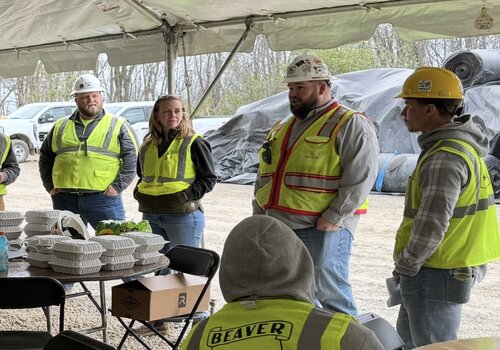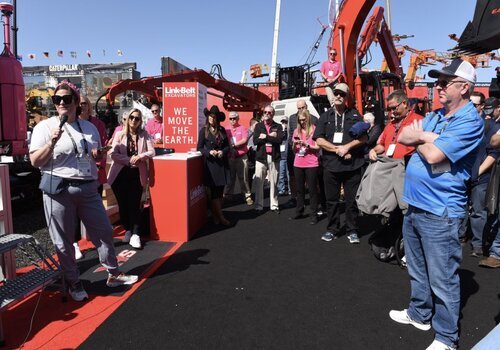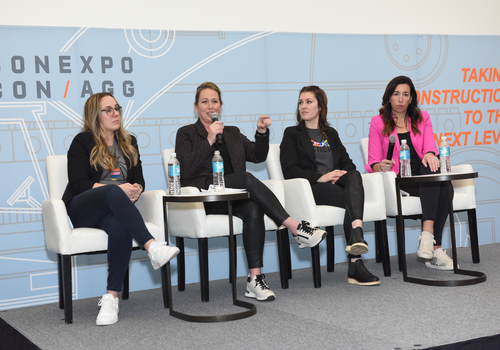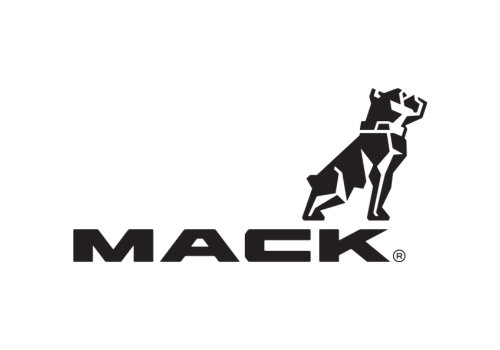Imagine you are 19 years old and working the night shift in a sand and gravel mine in northeast Ohio. Your supervisor asks you and a co-worker to do something for which neither of you have been trained, cleaning out a 150-ton sand bin. You don’t realize how dangerous it could be, so you start doing it. And then things begin to go wrong.
That’s the situation Jordan Stevenson, now Lead Safety Supervisor at Canton, Ohio-based Beaver Excavating, found himself in. During his CONEXPO-CON/AGG 2026 session, A Cold Night in February that Changed Everything, he will take you with him back to that day and show you step by step what happened and how it changed his anticipated career path.
LEARNING MORE WAYS TO BE SAFE
Stevenson had only planned to work at the mine for about six months and then join the Air Force. “This accident gave me a different perspective on what I was doing there,” he said. “It caused me to become very serious about safety.” He didn’t want anyone else to have a bad experience similar to what he and his co-worker had gone through. He worked at the mine for 15 years before going to Beaver Excavating to become their Lead Safety Supervisor.
After this accident, the mining company made many changes to prevent accidents like this from happening again. Stevenson’s job at the mine involved doing everything: working the scales, loading product and actual mining. The accident motivated him to volunteer to get safety training which the company paid for. His work evolved into running safety committees at this mine and at the company’s corporate level.
When he moved from mining to excavating, Stevenson encountered very different safety risks, particularly trenching, which he had not seen done before. Now he has crews in trenches every day, a danger he felt unprepared for initially. Beaver Excavating hired him for his mining experience and said they would train him for everything else.
“Beaver Excavating does a very good job protecting employees when in trenches, with rules exceeding OSHA standards,” he said, adding that he needed to become an expert quickly to teach and enforce those rules.
He has taken all kinds of safety training classes, sometimes repeating courses because he learns something new from different instructors. Beaver Excavating has some specialized safety people who focus on particular situations along with those like Stevenson who do a broader variety of safety tasks.
“Every day is something different,” he said. “People responsible for safety have to ask lots of questions.”
HOW TO MAKE JOB SITES SAFER
A particular concern when excavating is working in confined spaces.
Stevenson wants others to remember that some jobs will require having a third-party rescue team available if needed. You may need to anticipate what might happen based on the tasks that will be done in the space, and you will need to be prepared to deal with whatever occurs.
“The number one priority for confined space jobs is having a plan in case things go wrong,” Stevenson said.
Training and more training for workers, job site supervisors and safety supervisors is the only way to make job sites safer, Stevenson shared.
“You don’t know what you don’t know,” Stevenson said. “We push hard on our safety department and job site leaders. Everyone gets multiple trainings so they are prepared once in the field. Sometimes supervisors have to stop work despite deadlines to have the right tools and equipment there to do the job safely.”
Beaver Excavating trains how to work safely by using a competent person for confined space, excavation and trenching. All of the company’s foremen and superintendents must have OSHA 30-hour certification. This is something other companies can easily implement to help keep all workers safe.
“Many large contractors we work for now require that OSHA certification has been completed within the last five years, so workers have the most up to date information,” Stevenson said. “We have superintendents who have experience with large jobs and can help our other superintendents when they encounter similar situations.”
He says workers need to feel empowered to always be willing to ask for help.
WHY SAFETY WAS THE RIGHT CAREER
What Stevenson most likes about being in the safety field are the people he works with and the ever-changing projects he’s part of. He has a strong desire to protect the people around him. Solving problems and making the worksite safer gives him a sense of purpose. “I like being someone workers can reach out to when they’ve got a safety concern and know they won’t get in trouble,” he said.
People working in safety should never stop learning and should always ask questions.
“I work in a field with people who have 40 years' experience and have seen things I haven’t seen,” he pointed out. “I find those people and ask them a lot of questions. Everyone does things in their own unique way. You will benefit by having a mindset of learning something new every day. Superintendents with knowledge love to tell people what they know, why they do things a certain way, and why that’s important. Just ask them for help and they will happily share their knowledge.”
Be sure to bring your questions to Stevenson’s CONEXPO-CON/AGG 2026 session and you’ll leave with answers.
“Always remember that every decision we make in the field has real life consequences,” he said. “You have to be the supervisor who doesn’t put an untrained kid in a dangerous situation like I lived through. Safety matters all the time.”
During Jordan Stevenson’s CONEXPO-CON/AGG 2026 session, A Cold Night in February that Changed Everything, he will share his story with the audience, letting them know what failed and how changes were made after the incident to greatly improve safety culture.
Photo Credit: Jordan Stevenson/Beaver Excavating












